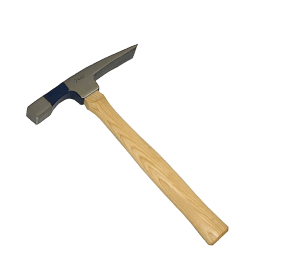Brick Hammer: Difference between revisions
From DT Online
mNo edit summary |
Added Template |
||
| (One intermediate revision by one other user not shown) | |||
| Line 13: | Line 13: | ||
---- | ---- | ||
{{Brick Hammer Buyers Guide}} | |||
{ | |||
[[Category:Hammers]] | [[Category:Hammers]] | ||
Latest revision as of 10:58, 15 May 2016

Description
Brick Hammers (aka Mason's Hammers or by Geologists as Rock Hammers) these have one flat hammer face and one chisel edge.
Features and Uses
They are commonly used to cut a brick or piece of rock to size. Make light blows with the chisel-end all the way around the block or brick and then a sharp blow with the hammer end will give a clean cut.
Safety Point! Wear eye protection and work gloves when working with masonry.
- 12oz Hammers (0.45kg) are a good useful size for general work in Design and Technology.
- Larger 2lb hammers (1kg) are used for heavier work such as Blacksmithing for example.
- Smaller hammers (e.g. 4oz and 8oz) are suitable for jewellery work and model engineering applications.
- Brick Hammers between 1lb and 1.5lb weight (450g to 700g) are suitable for school use and are available also with a Scutch Comb Chisel at one end which can be used for shaping brick and masonry.
- A 2lb Lump Hammer (0.9kg) is a good useful size for general work in Design and Technology and home maintenance tasks.
- 2lb to 4lb Sledge Hammers (1-2kg) are a suitable size for general forge-work in Design and Technology since hammers heavier than 4lb would be difficult for students to use.
 |
 |
 |
 |
 |
 |
 |
 |
| Ball Pein Hammer |
Blacksmiths Hammers |
Brick Hammer |
Claw Hammer |
Cross Pein Hammer |
Lump (or Club) Hammer |
Pin Hammer |
Sledge Hammer |